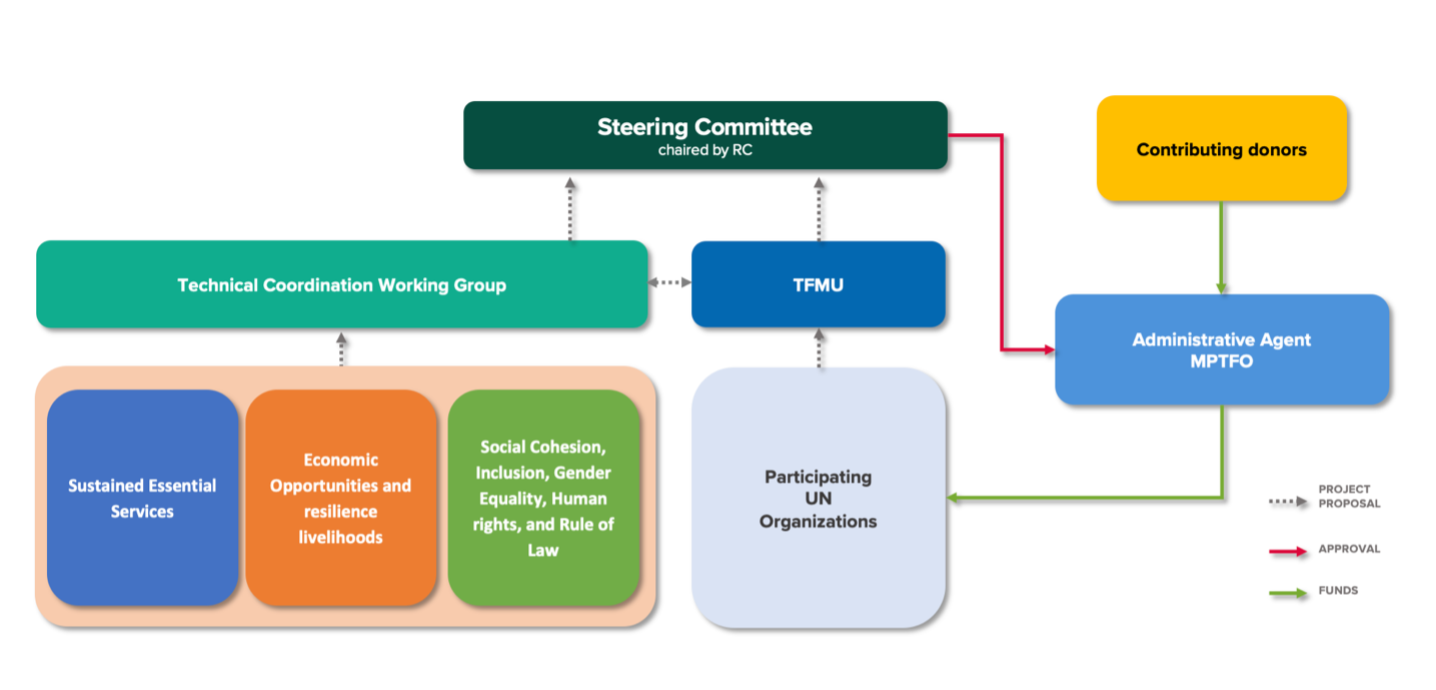GovernanceGovernance arrangements
The Special Trust Fund for Afghanistan has a two-tier decision-making and coordination structures through the Advisory Board and Steering Committee.
The governance structure of the Fund is led by the Steering Committee (SC), which is chaired by the Deputy Special Representative of the Secretary General/UN Resident Coordinator/Humanitarian Coordinator and co-chaired by a donor representative. Members of the Steering Committee include representatives of all contributing donors andParticipating UN Organizations; the Fund Secretariat and the Administrative Agent also participate ex-officio. To strengthen coherence and ensure strategic cooperation, the Head of the Afghanistan Humanitarian Fund Secretariat will be invited as an observer to the SC meetings. The Steering Committee is responsible for providing oversight and exercising overall accountability for the Fund, approving funding priorities, reviewing and approving funding for joint UN programmes, leading resource mobilization efforts, instructing the Administrative Agent to disburse the resources to the Participating UN Organization, reviewing the Fund status and its overall progress, reviewing and approving the periodic progress reports, commissioning reviews and "lessons learned" reports on the performance of the Fund; and approving amendments to the Terms of Reference of the Fund, as required after due consultation with stakeholders.
The Technical Coordination Working Group (TCWG) is composed of representatives of UN agencies and donors. It is tasked to prepare and regularly review/update recommendations for the allocation strategy, including geographic and thematic prioritization criteria, for the consideration of, and final decision by, the Steering Committee. The TCWG, in this process, ensures that prioritization criteria are well informed by actual needs reported from the field, as well as through relevant humanitarian coordination mechanisms (under the Humanitarian Response Plan), with a view to leveraging their needs assessments and ensure complementarities in the prioritization exercise. The Group provides technical guidance and high-level oversight to ongoing projects and makes recommendations to ensure synergies and efficiencies are capitalized across thematic windows and/or regions as much as possible – with a view to minimizing potential duplications and facilitating/promoting collaboration, complementarities, and economies of scale.
The Trust Fund Management Unit (TFMU) is the Fund Secretariat and responsible for operational functioning, as well as provision of technical and management support to the Steering Committee. The Secretariat, hosted within UNDP, is responsible for executing and coordinating all Fund management functions of the Fund; planning and preparing meetings of the Steering Committee; facilitating the work of the TCWG; submitting Fund Transfer Requests to the Administrative Agent; facilitating collaboration and communication between Participating Organizations, facilitating systematic cooperation with the Afghanistan Humanitarian Fund, developing and updating the Fund's Operations Manual; monitoring, evaluating, and controlling operational risks and programme implementation; consolidating the narrative of annual and final reports and presenting them to the Steering Committee and the Administrative Agent; drafting the resource mobilization strategy; managing and supporting communications, public information, and visibility; liaising with the Administrative Agent on Fund administration issues, and bringing together technical expertise from the participating UN organisations.
The Secretariat also uses informal mechanisms to interact with donors at the technical level to prepare for the Steering Committee meetings. The costs of the Secretariat are charged to the Fund as direct costs. The budget for the Secretariat is submitted to the Steering Committee on a regular basis (every two years, subject to annual reviews) and the Secretariat staffing structure is adjusted by the Steering Committee as per needs and budget availability.
Programme implementation is the responsibility of Participating Organizations. Each organization is programmatically and financially responsible for resources received in accordance with its own regulations, rules, directives and procedures. Indirect costs of the PUNO recovered through programme support costs will be harmonized at 7%. Implementing Partners can receive funding from the Fund through the PUNOs.
Funds are routed by way of a pass-through mechanism. Participating Organizations receive funds through the Administrative Agent, Multi-Partner Trust Fund (MPTF) Office. The Administrative Agent is responsible for the receipt, administration and management of contributions from donors, disbursement of funds to Participating Organizations, and consolidation and dissemination of progress reports to donors.





